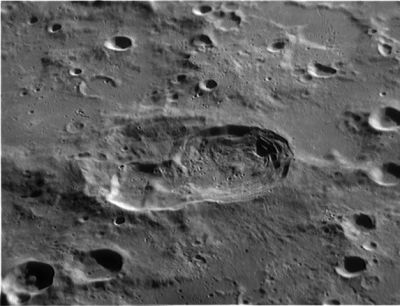Hainzel
Contents
Hainzel
|
Lat: 41.3°S, Long: 33.5°W, Diam: 70 km, Depth: 4.43 km, [/R%C3%BCkl%2063 Rükl: 63] |
Table of Contents

Wes Higgins, north to right
Images
LPOD Photo Gallery Lunar Orbiter Images Apollo Images
The Hi-Res scan of Lunar Orbiter 4's photograph of Hainzel and its surroundings reveals also the possible concentric look of crater Hainzel H near the frame's upper right corner. See: LOIV-142-h2. Hainzel H is the crater just south of the distinct valley-like formation.
The location of Hainzel H, observed through a telescope, is immediately east of the officially unnamed dark "V"-shaped lacus-like formation at 37° South/ 35° West, and north of Hainzel itself.
Research: Danny Caes
Maps
([/LAC%20zone LAC zone] 111D1) LAC map Geologic map
Description
Description: Elger
([/IAU%20Directions IAU Directions]) HAINZEL.--This remarkable formation, which is about 55 miles in greatest length, but is hardly half so broad, derives its abnormal shape from the partial coalescence of two nearly equal ring-plains, the walls of both being very lofty,--more than 10,000 feet. It ought to be observed under a morning sun when the floor is about half illuminated. At this phase the extension of the broad bright terraced W. border across a portion of the interior is very apparent, and the true structural character of the formation clearly revealed. The floor abounds in detail, among which, on the S., are some large craters and a bright longitudinal ridge. Hainzel is flanked on the E. and S.E. by a broad plateau, E. of which stand two ring-plains about 15 miles in diameter, both having prominent central mountains and bright interiors.
Description: Wikipedia
Additional Information
- Depth data from [/Kurt%20Fisher%20crater%20depths Kurt Fisher database]
Westfall, 2000: 4.43 km
Cherrington, 1969: 3.2 km - Possible concentric crater Hainzel H (the 29th item in C.A.Wood's list of Concentric Craters, published in 1978).
- Hainzel A is [/Stratigraphy Eratosthenian] in age.
- Satellite craters Hainzel B, J, K, and R are on the [/ALPO%20list%20of%20banded%20craters ALPO list of banded craters]
The strange unnamed chain of depressions north-northeast of Hainzel
It is depicted as a common rille on Chart E7 in the System of Lunar Craters (SLC) and also on Chart 63 in Antonin Rukl's moonatlas, but... more correctly as a chain of depressions on Chart 91 in the Times Atlas of the Moon. So... what is it really? Anyway, it should get its own official name! - DannyCaes DannyCaes Oct 27, 2017
Nomenclature
Paul Hainzel (1527–1581) was a German astronomer. In 1569, Paul Hainzel and his brother Johannes Baptista Hainzel helped their friend [/Tycho Tycho] Brahe design and construct a large quadrant.
LPOD Articles
Another View of a Tormented Floor A Very Tormented Floor Mee Too! Nothing to Fear Here
Bibliography
This page has been edited 1 times. The last modification was made by - tychocrater tychocrater on Jun 13, 2009 3:24 pm - afx3